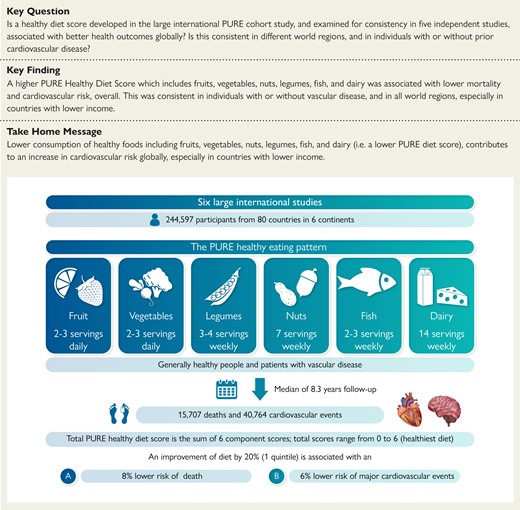Consuming fruits, vegetables, legumes, nuts, fish and whole-fat dairy products is key to lowering the risk of cardiovascular disease, including heart attacks and strokes. The study also found that a healthy diet can be achieved in various ways, such as including moderate amounts of whole grains or unprocessed meats.
The World Health Organization estimates ~18 million people died from cardiovascular disease in 2019, representing 32% of all global deaths. Of these deaths, 85% were due to heart attacks and strokes. Population Research Health Institute researchers and their global collaborators analyzed data from 245,000 people in 80 countries from multiple studies.



I totally agree with the first five, but not sure about the last one, whole fat dairy. Eg cheese contains saturated fat which isn’t healthy. I had assumed that lower fat milk would be better for eg the calcium.
Lipids are one of the four macromolecules found in life. Moderation of lipids is the key part here. LDL (bad cholesterol) is needed for digestion, cell signaling, and immune cells require it for certain functions. It’s the goldilocks principle, too much or too little is an issue.
I had to look it up, but reducing milk by 2% fat increases the calcium ~6mg/cup. A little calcium goes a long way for human cell functions, so it’s a decent increase for sure.
Turns out that saturated fat isn’t the big awful thing that has been peddled for decades. What turns out to be better for you is shorter chain saturated fats produced by a health gut microbiome, and that feeding your microbiome is essential to better health. Also, not all calories are equal. It turns out items higher in resistant starch feeds a healthy microbiome and in turn those bacteria convert the food calories into short chain saturated fats which feed you. See this recent Nature Comm paper.
Thanks for sharing. I had a scan of that paper but I don’t see any mention of saturated fats? Not saying I don’t agree, it is just contrary to what my GP has been telling me. I have slightly elevated cholesterol and it runs through the family, so I’m watching intake of saturated fats.